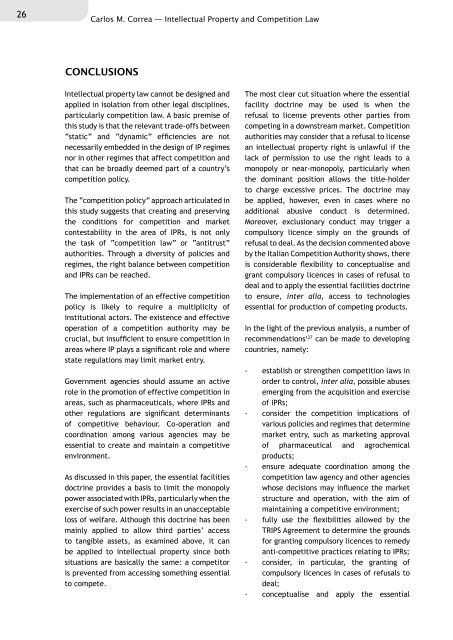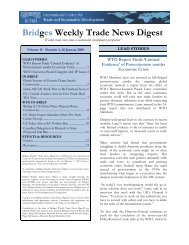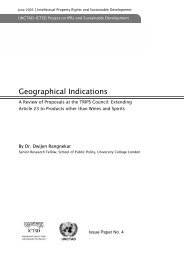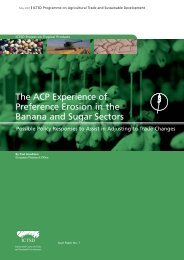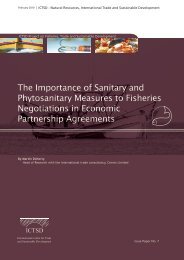Intellectual Property and Competition Law - IPRsonline.org
Intellectual Property and Competition Law - IPRsonline.org
Intellectual Property and Competition Law - IPRsonline.org
You also want an ePaper? Increase the reach of your titles
YUMPU automatically turns print PDFs into web optimized ePapers that Google loves.
26Carlos M. Correa — <strong>Intellectual</strong> <strong>Property</strong> <strong>and</strong> <strong>Competition</strong> <strong>Law</strong>Conclusions<strong>Intellectual</strong> property law cannot be designed <strong>and</strong>applied in isolation from other legal disciplines,particularly competition law. A basic premise ofthis study is that the relevant trade-offs between“static” <strong>and</strong> “dynamic” efficiencies are notnecessarily embedded in the design of IP regimesnor in other regimes that affect competition <strong>and</strong>that can be broadly deemed part of a country’scompetition policy.The “competition policy” approach articulated inthis study suggests that creating <strong>and</strong> preservingthe conditions for competition <strong>and</strong> marketcontestability in the area of IPRs, is not onlythe task of “competition law” or “antitrust”authorities. Through a diversity of policies <strong>and</strong>regimes, the right balance between competition<strong>and</strong> IPRs can be reached.The implementation of an effective competitionpolicy is likely to require a multiplicity ofinstitutional actors. The existence <strong>and</strong> effectiveoperation of a competition authority may becrucial, but insufficient to ensure competition inareas where IP plays a significant role <strong>and</strong> wherestate regulations may limit market entry.Government agencies should assume an activerole in the promotion of effective competition inareas, such as pharmaceuticals, where IPRs <strong>and</strong>other regulations are significant determinantsof competitive behaviour. Co-operation <strong>and</strong>coordination among various agencies may beessential to create <strong>and</strong> maintain a competitiveenvironment.As discussed in this paper, the essential facilitiesdoctrine provides a basis to limit the monopolypower associated with IPRs, particularly when theexercise of such power results in an unacceptableloss of welfare. Although this doctrine has beenmainly applied to allow third parties’ accessto tangible assets, as examined above, it canbe applied to intellectual property since bothsituations are basically the same: a competitoris prevented from accessing something essentialto compete.The most clear cut situation where the essentialfacility doctrine may be used is when therefusal to license prevents other parties fromcompeting in a downstream market. <strong>Competition</strong>authorities may consider that a refusal to licensean intellectual property right is unlawful if thelack of permission to use the right leads to amonopoly or near-monopoly, particularly whenthe dominant position allows the title-holderto charge excessive prices. The doctrine maybe applied, however, even in cases where noadditional abusive conduct is determined.Moreover, exclusionary conduct may trigger acompulsory licence simply on the grounds ofrefusal to deal. As the decision commented aboveby the Italian <strong>Competition</strong> Authority shows, thereis considerable flexibility to conceptualise <strong>and</strong>grant compulsory licences in cases of refusal todeal <strong>and</strong> to apply the essential facilities doctrineto ensure, inter alia, access to technologiesessential for production of competing products.In the light of the previous analysis, a number ofrecommendations 127 can be made to developingcountries, namely:- establish or strengthen competition laws inorder to control, inter alia, possible abusesemerging from the acquisition <strong>and</strong> exerciseof IPRs;- consider the competition implications ofvarious policies <strong>and</strong> regimes that determinemarket entry, such as marketing approvalof pharmaceutical <strong>and</strong> agrochemicalproducts;- ensure adequate coordination among thecompetition law agency <strong>and</strong> other agencieswhose decisions may influence the marketstructure <strong>and</strong> operation, with the aim ofmaintaining a competitive environment;- fully use the flexibilities allowed by theTRIPS Agreement to determine the groundsfor granting compulsory licences to remedyanti-competitive practices relating to IPRs;- consider, in particular, the granting ofcompulsory licences in cases of refusals todeal;- conceptualise <strong>and</strong> apply the essential


